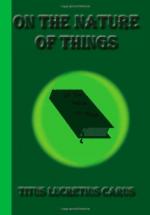|
This section contains 8,517 words (approx. 29 pages at 300 words per page) |

|
SOURCE: Esolen, Anthony M. “Introduction.” In Lucretius: “On the Nature of Things: De rerum natura,” edited and translated by Anthony M. Esolen. pp. 1-21. Baltimore, Md.: The Johns Hopkins University Press, 1995.
In the following excerpt, Esolen explains that Lucretius wrote the De rerum natura to fight superstition. He also examines Lucretius's influence on Vergil, Cicero, Horace, and other writers.
Lucretius's Milieu
We know little about Titus Lucretius Carus. He was probably born in the early first century b.c., with 99 and 95 the limits of possibility. The year 55 is usually given for his death. Saint Jerome, following a lost work by the historian Suetonius, relates two tantalizing bits of gossip about Lucretius: that Cicero edited his great poem, and that he was poisoned by a madness-inducing aphrodisiac given him by his wife. As for the first assertion, scholars doubt that Cicero had more than a perfunctory role in assembling...
|
This section contains 8,517 words (approx. 29 pages at 300 words per page) |

|


